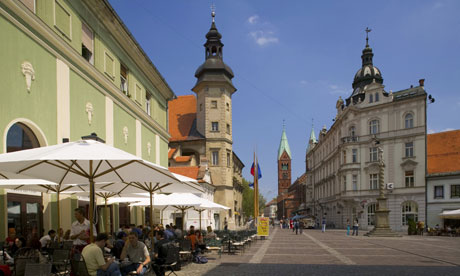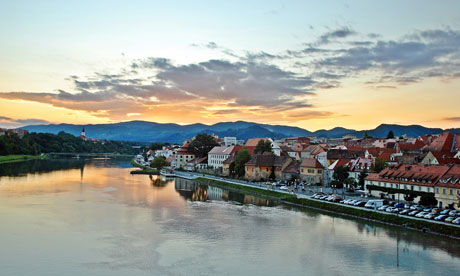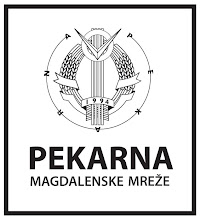"The biggest jazz stars came to Maribor in the 1980s," reminisces the drinker sitting beside me in KGB, a bar and cabaret venue in Maribor, Slovenia's second city. The legendary US bassist Reggie Workman married a woman from Maribor, she adds, "because of course you had the parties afterwards".
It isn't hard to imagine such glamour in this former wine cellar: it is cosy and wood-panelled, a candlelit space that hosts live performances from experimental theatre to classic blues (the joke with the name KGB is that the initials stand for "culture and music den" in Slovene).
Maribor has long been known for avant-garde jazz, but this is by no means the only area in which the city made its name. The KGB bar (Vojasniski Trg 5, +386 2252 3077)was recommended to me by Zoran Predin, a Mariborian singer-songwriter whose new-wave band, Lacni Franz (Hungry Franz), achieved fame across Yugoslavia in the 1980s for its cryptic barbs against the communist regime. Predin now lives in Ljubljana but retains a loyalty to his home city. He says its position near the Austrian border and its status as a major industrial centre opened it up to diverse influences and encouraged creativity – earning it the nickname "little Liverpool".
"We could watch Austrian TV channels and cross the border to buy things, which was not possible in the capital," says Predin. "And we were nearer to Zagreb."
The architecture of the old centre (including the Rathaus) attests to Maribor's pre-first world war history as a predominantly Austro-Hungarian town. But the fact that a third of these buildings are now unoccupied tells another story – of the city's post-industrial decline since the break-up of Yugoslavia. The idea of building a new creative economy was behind the decision to award Maribor European capital of culture status for 2012 (along with Guimarães in Portugal).
Eclecticism is still evident in Maribor's cultural life, and not just at KGB. The annual Lent festival (festival-lent.si/en), with a main stage on the bank of the Drava river, is one of the biggest in the Balkans (attended by 600,000 people last year) – James Brown and Stéphane Grappelli have been among past headliners. Maribor also hosts a festival of classical music (2011.festivalmaribor.si/en/festival), the Borstnikovo (theatre) festival (borstnikovo.si/en) and its Kibla cultural centre (kibla.org/en) focuses on contemporary multimedia art.
All Maribor's major galleries, bars, and music venues are in easy walking distance of each other. And if you do tire you can always stop at one of the upmarket cafes on Poštna Ulica for a craft beer or gourmet coffee – or at Bosnian restaurant Bašcarsija (bascarsija.si/index.php/en/resstrant) for cevapcici (spicy sausages served with bread). Overlooking the city are the mountains of the Pohorje Massif (home to the biggest ski resort in Slovenia), and – fittingly for a region that has been making wine since Roman times – innumerable vineyards can be found in the surrounding green hills. The world's oldest vine (400 years old) grows outside a small wine museum and tasting centre on the Drava (tinyurl.com/oldvinemaribor), and the Vinag wine cellar (vinag.si) holds 5.5m litres of wine within its 3km of tunnels.
 Maribor, Slovenia. Photograph: Walter Bibikow/Getty Images
Maribor, Slovenia. Photograph: Walter Bibikow/Getty Images The pedestrianisation of a large square this year has helped to smarten up the city centre. And although other ambitious plans have been shelved due to financial and political difficulties, it is perhaps in keeping with Maribor's historic spirit that regardless of these problems, an underground, largely independent cultural scene is thriving.
One of the most exciting contemporary developments is Pekarna (pekarna.org), an alternative cultural centre in a former military bakery and storage facility, which was occupied by a coalition of artists, intellectuals and activists as soon as the Yugoslav army abandoned it after Slovenia won independence in 1991. Now publicly owned, but still independently operated, Pekarna (the word means bakery) comprises several clubs, a large secondhand bookshop, a hostel, and Gustaf Hall, which hosts philosophical discussions and around 150 music performances a year.
"It's any music that is original and sincere, of all genres," says manager Mitja Huplic, who also runs a series of improvised concerts called Mariboring (mariboring.blogspot.com) in Gustaf Hall. He says Slovenia's alternative music scene is in good health (though he got no funding from the Maribor 2012 project), and that this small country's cultural offerings can rival those of major European cities. Slovenia's size, he adds, has encouraged an integrated scene. "You have similar places in London and Berlin, but here they are all over the country. There are about 50 places like Pekarna, even in small villages."
The village of Trate, half an hour to the north and right on the Austrian border, was once a mecca for alternative musicians, while a punk band called Indust Bag used to hold gigs in a cellar under a castle in the southern village of Metlika. As well as Pekarna and KGB, independent music venues in Maribor itself include Satchmo's jazz bar (jazz-klub.si) and Huda Kava cafe (2-12 Poštna Ulica).
At Pekarna, I attend an open recording session for a musical collective, Sportbilly Krši Embargo, in Gustaf Hall. The brick walls are painted blood-red, there are leather sofas, detached rows of auditorium seating, a few beer cans and a saucepan of mate tea. Mariboring gigs can attract audiences of up to 50, but now there are just three or four – and one, it turns out, is the pianist, called Nejc, who leaves with Huplic to fetch the keyboard from his house.
"He is 15 or 16 years old. He writes his own music," whispers Huplic. "There was some problem with his parents about whether he could stay out this late."
After the gig, we head to the unofficial headquarters of Maribor's creative crowd, tiny Tildo's bar (Slomškov Trg 13), on a central, tree-filled square.
"You can meet different kinds of people here: musicians, actors, doctors, welders – but everyone is on the same level," says Srdjan Trifunovic, 32. He is a member of a volunteer team who last year reopened Kino Udarnik (zavodudarnik.wordpress.com), one of four defunct 1930s cinemas in Maribor, to screen independent films.
For a city of its size, Maribor seems to have a barely comprehensible number of festivals. But maybe it's because everyone knows each other that festivals sprout up.
"If you have an idea and three friends, you have a festival," says Ziga Brdnik, 26, who also worked on the cinema project.
There's a similar vibe at Velenje, one of five "partner towns" that will jointly hold the capital of culture title with Maribor. Next year it will hold a brass band performance 150m underground in an old coal mine. Velenje also hosts an annual Pippi Longstocking festival (festival-velenje.si), and Novo Mesto, another partner town, has jazz festival Jazzinty (jazzinty.com).
"Every Slovenian musician that is even a little bit close to jazz has been a part of Jazzinty," says Jure Dolinar, programme manager. 'There is jazz in Ljubljana too, but there the places are very trendy. In Maribor it is still pure.'
• EasyJet (easyJet.com) flies from Stansted to Ljubljana, two hours by train or car from Maribor, from £34. For information on Maribor 2012, see maribor2012.info, and for the city, see slovenia.info





